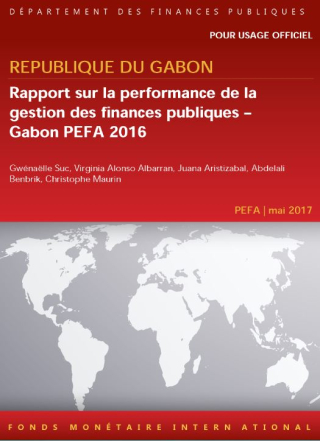Posted by Gwénaëlle Suc, Anicette Koumba, Danielle Nyamat and Wilfried Nzamba Mangala[1].
The 2016 Gabon Public Expenditure and Financial Accountability (PEFA) report is now available online. This publication concludes a six-month process to assess the performance of the Gabonese public financial management (PFM) system using the 31 indicators which make up the PEFA framework. This is the first PEFA to be undertaken in the Central African Economic and Monetary Community (CEMAC) using the upgraded 2016 methodology. This revised PEFA framework includes four new indicators, expands and refines existing indicators and recalibrates baseline standards for good performance in many areas.
This assessment was funded by the European Union and led by the IMF’s Fiscal Affairs Department (FAD) in close cooperation with the Gabonese authorities. Since the previous 2013 PEFA assessment, Gabon has implemented major PFM reforms. These include the adoption of a new organic budget law and introducing program budgeting. These reforms had a direct positive impact on the 2016 PEFA scores with a quarter of the indicators showing improvement mainly in the areas of policy-based budgeting and timeliness of fiscal reporting. Nevertheless, performance against several indicators still fell below the basic levels set by PEFA standards. In particular, in the areas of managing arrears, expenditure execution, internal and external control and audit, public procurement, public investment management, oversight of public entities and quality of fiscal reporting.
The successful completion of the 2016 PEFA process relied on the strong commitment of the Gabonese government and on an inclusive work process. The PFM reform unit in the Budget Ministry acted as the technical secretariat for the assessment, centralizing data collection and liaising with all technical counterparts. Dedicated staff were designated as focal points in each directorate or institution involved in the evaluation and these officials were trained in the PEFA methodology including in the Court of Accounts and the Parliament. During the three-week assessment phase in the field, weekly meetings were held with all focal points, the technical secretariat and the assessment team, to take stock of provisional results, ensure consistency between interdependent indicators or list missing documents. The European Union, the World Bank and the African Development Bank participated in the committee reviewing the report, jointly with the Gabonese government, the IMF and the PEFA Secretariat.
Based on the results of the PEFA assessment, the Budget Minister organized a seminar to build a three-year PFM reform roadmap. With the assistance of FAD and AFRITAC Central advisors, participants in the seminar identified and sequenced reforms to improve the performance of the PFM system. This roadmap includes initiatives to restore the regularity and reliability of budget execution, to mitigate fiscal risks and to improve the comprehensiveness and transparency of fiscal reporting.
The PEFA report and the reform roadmap were presented to the Minister of Economy and the Minister of Budget and their senior staff. The Minister of Budget led a dialog with the main donors on PFM reform priorities which has already resulted in some concrete actions. The economic recovery program, recently adopted by the Gabonese Government and supported by the IMF includes measures to ensure the sustainability of public finances. In this context, an executive order from the Minister of Budget has been published in May, establishing a new expenditure execution framework and new procedures to strengthen expenditure controls based on the PEFA assessment.
[1] Gwénaëlle Suc is Economist at the Fiscal Affairs Department and led the Gabon 2016 PEFA assessment; Anicette Koumba is the Director of the administrative unit of the Budget Ministry in charge of PFM reforms (DEPPB) in Gabon; Danielle Nyamat and Wilfried Nzamba Mangala are Deputy Directors.
Note: The posts on the IMF PFM Blog should not be reported as representing the views of the IMF. The views expressed are those of the authors and do not necessarily represent those of the IMF or IMF policy.






